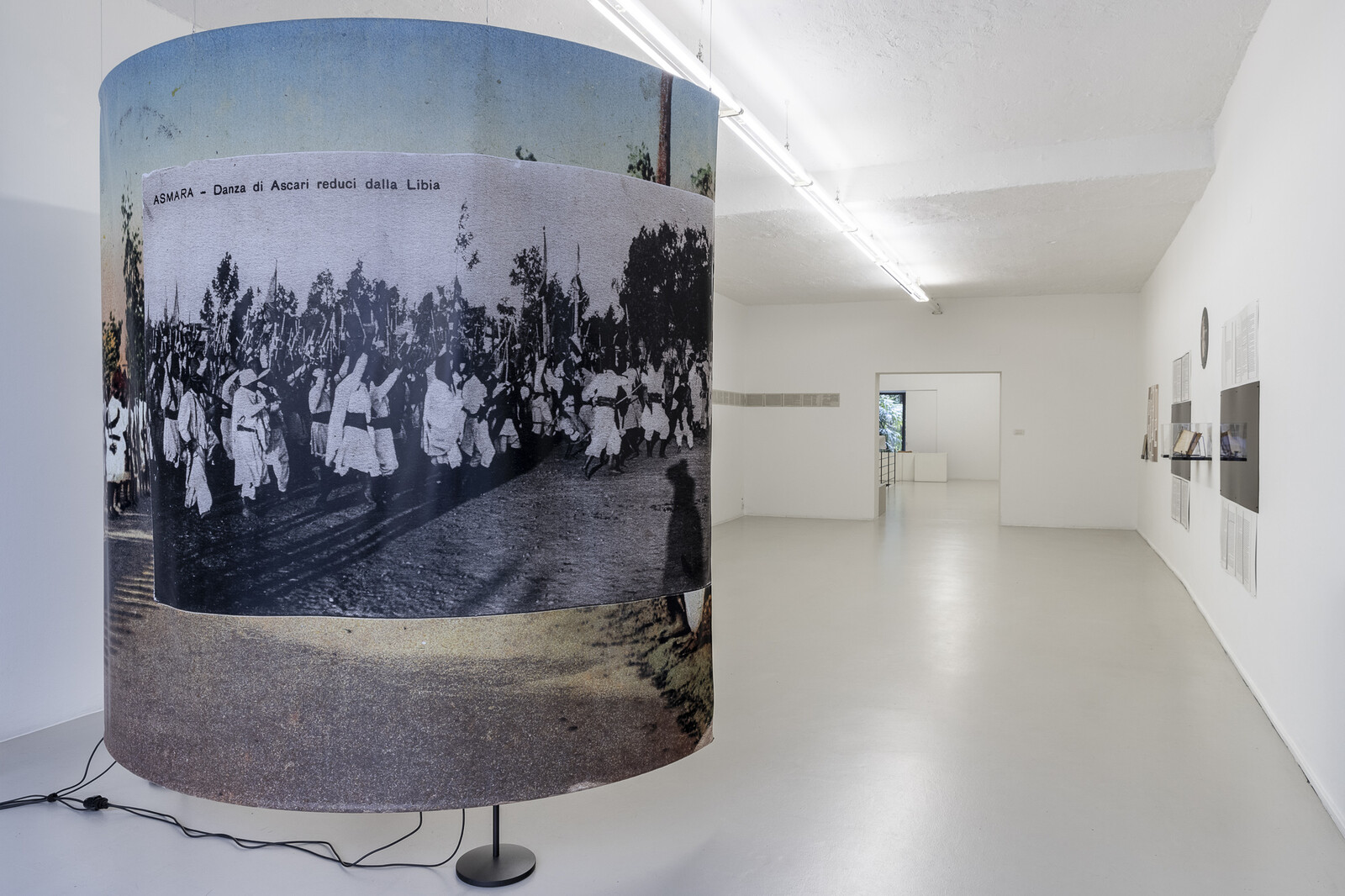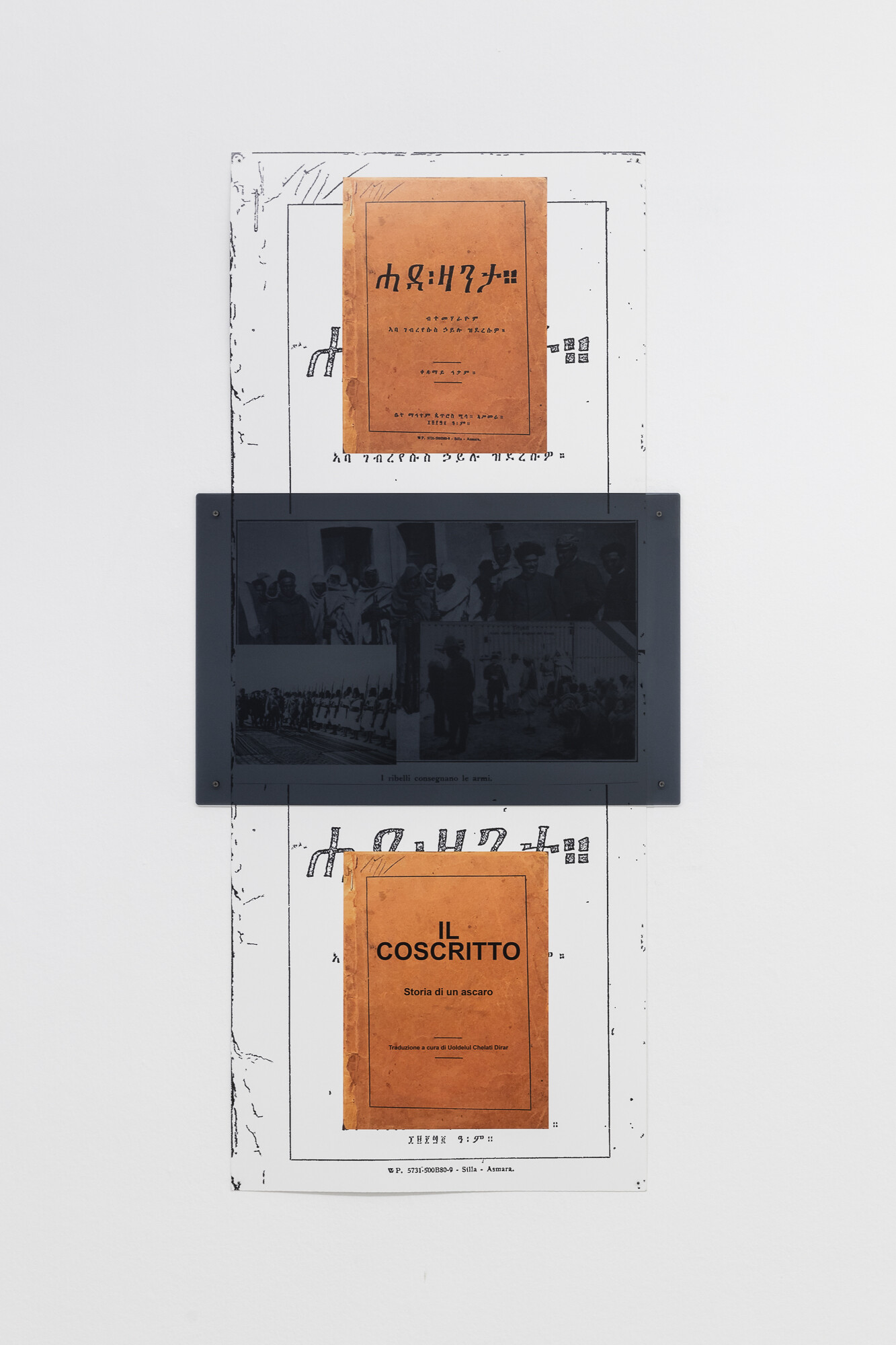Unruly Connections
May 13–July 30, 2022
Via Museo 29
39100 Bolzano
Italy
Hours: Tuesday–Friday 10am–7pm,
Saturday 10am–1pm
T +39 0471 971601
info@argekunst.it
The opening will feature a conversation between artist Alessandra Ferrini and historian Uoldelul Chelati Dirar.
Curated by Emanuele Guidi.
Alessandra Ferrini has engaged extensively with the Italian archive of coloniality, specifically carrying out investigating the obfuscation and distancing strategies that characterize the Italian colonial past In Libya.
Unruly Connections analyses practices of resistance to colonial violence, weaving together three stories of opposition to the “iconographic silence” towards the repression of the resistance movements in Libya at the end of the 1920’s.
Introduced by historian Alessandro Volterra, the term “iconographic silence” refers to general Rodolfo Graziani’s directive that prohibited photographing and circulating any documentation of the brutal repression of Libyan people at the hands of the Italians, which included the use of outlawed chemical weapons and concentration camps. Alessandra Ferrini draws connections between people and literary works that, across different times and locations, challenged the censorship of this genocide.
The exhibition revolves around the willingness to commission the first Italian translation of the novel The Conscript by Gebreyesus Hailu. Written in 1927, The Conscript was transmitted orally because of Italian censorship and was finally published in 1950. The book describes the experiences of the Eritrean Ascari, soldiers enrolled by the Italian army to fight against the resistance in Libya. It Is the first novel in Tigrinya language and one of the first examples of anti-colonial literature, which has remained virtually unknown as it was translated into English only in 2012. The Italian translation, developed by historian Uoldelul Chelati Dirar, will be presented in the exhibition in four consecutive stages, each one announced through excerpts published in our newsletter: ar/ge kunst will therefore also act as a platform for translations, readings, publishing and in-depth analysis.
Within the exhibition, the translation of The Conscript will intersect with the stories of Danish journalist Knud Holmboe (1902–1931) and of writer, anarchist, and feminist Leda Rafanelli (1880–1971). After converting to Sufism, Knud Holmboe arrived in Libya in 1930, where he came into contact with the Senussi resistance in Cyrenaica, denouncing the atrocious violence of Italians in a diary and photographic series published in 1931 and titled Desert Encounters (initially censored in Italy and only translated in 2005).
In the same year, he was killed in Jordan—probably at the hands of the Italian government, although this has never been officially proved. Alessandra Ferrini tells Holmboe’s story, comparing it to other documents related to his assassination that she mysteriously received via email and Twitter through an anonymous historian/journalist in August 2020.
Urged by her alleged North African family roots, Leda Rafanelli briefly moved to Alexandria in 1900, where she gravitated towards the Italian anarchist community and converted to Islam. Identifying herself as a “Muslim anarchist,” her writings—which showcase a very strong interest for and solidarity with the oppressed—intertwine anarchist propaganda, feminism, romance novels and Islam. Despite the strict surveillance she was subject to during the Fascist dictatorship, in 1929 she published romance novel L’Oasi. Romanzo arabo (The Oasis. Arab Novel), in which a passionate love story acts as the background for a reflection on colonial violence. Set in Tunisia and published under the pseudonym of Etienne Gamalier, the novel draws a parallel with the repression of the Libyan resistance by the Fascist military. Romance is thus employed to disguise political protest.
In addition to this, Unruly Connections will also reflect on the so-called “peaceful penetration”, which historian Roberta Pergher identifies as the settlement tactic connecting internal and external Italian colonialism, with specific regard to South-Tyrol and Libya.
Similarly, The Conscript is further compared with instances of forced conscription in South-Tyrol during the occupation of Ethiopia in 1935-36, stressing the complicated relationship between the process of Italianization and the racial hierarchies that characterise European Imperialism.
Through a practice-based approach to historiographic research, Alessandra Ferrini creates a constellation of marginalised characters and stories that emphasize similarities and connections among the peripheries of the Italian colonial empire. The act of editing iconographic materials and texts through different mediums and languages, among which the voice of the artist herself that offers a new potential reading of the resonances between such stories, provides a thoughtful reflection on activist writing and translating, but also on the ethical and political potential of artistic practice.
Alessandra Ferrini (Florence 1984, lives and works in London) is an artist and researcher. Experimenting with the expansion and hybridization of the documentary film, she works across moving images and installation as well as dialogic, collaborative, editorial and pedagogic formats. Her research questions the legacies of Italian colonialism and Fascism, with a specific interest for the past and present relations between Italy and the Mediterranean region. Her work has featured in international exhibitions, including: MOMus-Museum of Contemporary Art Thessaloniki (2021), Manifesta 13 Paralléles du Sud (Marseille, 2020), Museion Bozen (2020), Sharjah Film Platform (2019), Istanbul Biennal collaterale (Depo 2019), 2nd Lagos Biennal (2019), Manifesta 12 Film Programme (Palermo, 2018), Villa Romana (Florence, 2018 and solo show 2019), Fondazione Sandretto Re Rebaudengo (Turin, 2018, 2020, 2021 and 2022), Royal Anthropological Institute Film Festival (2017 and 2021), the 16th Rome Quadriennal (2016-17). She was the recipient of the 2017 Experimenta Pitch Award at the London Film Festival (British Film Institute) and the 2018 Mead Residency at the British School at Rome. Future exhibitions include: the 5th Casablanca Biennale and the Maxxi Bvlgari Prize 2022 (Rome). She is a PhD candidate at the University of the Arts London, a Research Fellow at the British School at Rome and Archive Milan. Her writing has been published internationally and features in Everything Passes Except the Past—Decolonizing Ethnographic Museums, Film Archives and Public Space edited by Jana Haeckel for Sternberg Press (2021).
With the kind support of:
Provincia Autonoma di Bolzano, Ripartizione Cultura
Comune di Bolzano, Ripartizione Cultura
Fondazione Cassa di Risparmio di Bolzano













